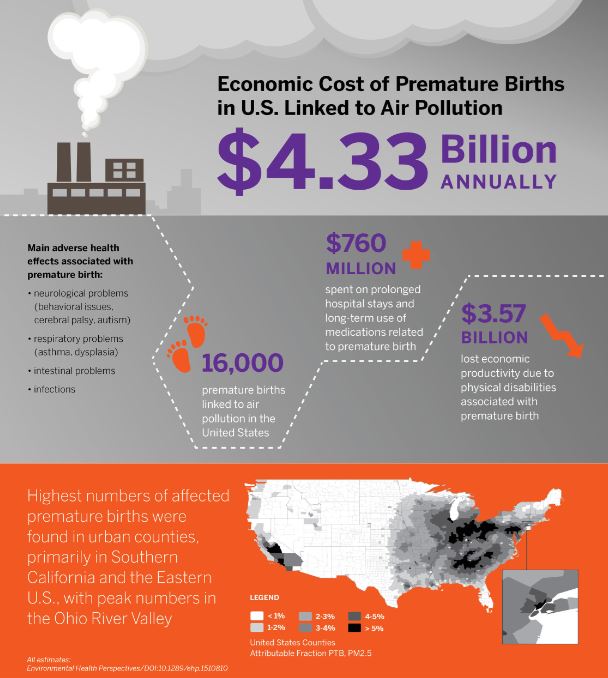NEW YORK, March 29, 2016 — The annual economic cost of the nearly 16,000 premature births linked to air pollution in the United States has reached $4.33 billion, according to a report by scientists at NYU Langone Medical Center. The sum includes $760 million spent on prolonged hospital stays and long-term use of medications, as well as $3.57 billion in lost economic productivity due to physical and mental disabilities associated with preterm birth.
 The new analysis, to be published in the journal Environmental Health Perspectives online March 29, is the first to examine the costs of premature births due to air pollution in the U.S., according to the study’s authors. Researchers say air pollution is known to increase toxic chemicals in the blood and cause immune system stress, which can weaken the placenta surrounding the fetus and lead to preterm birth.
The new analysis, to be published in the journal Environmental Health Perspectives online March 29, is the first to examine the costs of premature births due to air pollution in the U.S., according to the study’s authors. Researchers say air pollution is known to increase toxic chemicals in the blood and cause immune system stress, which can weaken the placenta surrounding the fetus and lead to preterm birth.
“Air pollution comes with a tremendous cost, not only in terms of human life, but also in terms of the associated economic burden to society,” says lead study investigator Leonardo Trasande, MD, MPP, a professor at NYU Langone. “It is also important to note that this burden is preventable, and can be reduced by limiting emissions from automobiles and coal-fired power plants.”
Trasande says the research team plans to share their findings with policymakers in an effort to help shape regulations and laws designed to reduce air pollution and protect public health.
According to Trasande, the national percentage of premature births in the U.S. has declined from a peak of 12.8 percent in 2006 to 11.4 percent in 2013, but the number remains well above those of other developed countries.
Moreover, he says, the decline is insufficient to meet the goal of 8.1 percent by 2020 set by the March of Dimes, a voluntary health organization dedicated to reducing premature births and infant mortality.
Statistical estimates developed by his team as part of their analysis attribute slightly more than 3 percent of premature births to air pollution.
Among the report’s other key findings was that the number of premature births linked to air pollution was highest in urban counties, primarily in Southern California and the Eastern U.S., with peak numbers in the Ohio River Valley.
Trasande says his team plans to conduct further research into the role of specific outdoor air pollutants, especially particulate matter, and whether any stages of pregnancy are more susceptible to their negative effects, including increased risk of heart and lung diseases. Trasande also plans to expand the analysis to a global level.















Follow Us